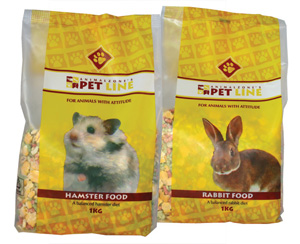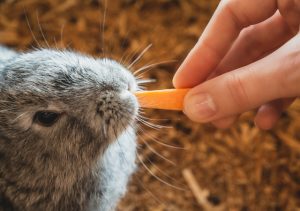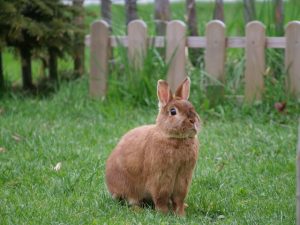
Whatever your reason, it may be tempting to short cut pellets or save some dollars here and there, a specific animal needs to eat food that is good and designed for their nutritional requirements.
Can I give my rabbit hamster food? Better not!
Rabbits are not hamsters and hamsters are not rabbits. They have different food requirements so if you feed your pet rabbit hamster food, it would not get the nutrients it needs because the food it’s eating isn’t specific to its digestive anatomy.
Rabbits need a diet that is particularly high in fiber and hamsters are not fed the same way so it follows food designed for hamsters would not be ideal for rabbits. Hamster food is not nutritionally balanced for a rabbit so it is not ideal to give your bunny anything that is not a direct response to what it needs.
Rabbits have a very sensitive digestive track and putting in food that they’re not familiar with or provides optimal nutrition really isn’t a smart or kind thing to do for your pet. There have been cases where the attitude, personality and overall demeanor of pets have changed because of a lack of nutrition. You may find that your pet is starting to look tired or sad, it may be malnutrition if fed inappropriate feeds over a long period of time.
Even as a short-term solution, a sudden change in rabbit feed may cause you pet trauma, stress and most probably, diarrhea. The ideal timeframe to introduce new food items is over a period of 7 to 10 days wherein you gradually increase the new item while decreasing the old food product.
In the event that feeds or pellets are suddenly not available for your rabbit, you can make do by feeding them their usual diet and encouraging your pet to take in more liquid as well as hay or grass.
If there are no rabbit pellets in your area or local grocery or pet store, the great thing about technology is you are no longer limited to shopping within your own neighborhood. You may opt to order food online and have it delivered to a place of the best convenience to you. In the meantime, you can modify your pet’s diet but staying within the parameters of an ideal rabbit regimen.
A Balanced Rabbit Diet
A rabbit’s main source of food should be in timothy or alfalfa hay depending on the age of your bunny. This will need to be supplemented by quality rabbit pellets, fresh green vegetables and a steady supply of clean water.
This balanced diet is ideal for the herbivore that is your bunny. It will give them all the nutrients, minerals, vitamins and fiber it requires. The hay is especially good for the rabbit's digestive system and will keep them healthy and it will also be the play area of your petting giving it exercise and enjoyment.
Any other food item outside of this diet should be given sparsely and as a treat. Some fruits and vegetables, which rabbits love may be given in small amounts. Fruits, with their high sugar content should be given no more than 1-2 teaspoons or the length of your thumb or that will be too much sugar intake for your bunny.
It’s important to vary the vegetables you give your pet so they will have a rich range of nutrients as well as a broad taste pallet. On the other hand, limit the number of fruits your rabbit eats, these are high in calories and make your bunny chubby. Vegetables are better for your rabbit because they do not have as many calories and are a good source of roughage for your rabbit.
Be serious about your pet’s diet because being lax may lead to complicated medical conditions that may be expensive and long term to reverse, if possible.
Note that overfeeding can lead to diarrhea and if this occurs focus on feeding your pet water and hay and eliminate new food items that may be causing the problem. Make it a point to wash food items before feeding your pet and avoid feeding straight from the fridge – the cold temperate of the food can upset your rabbit's stomach.





